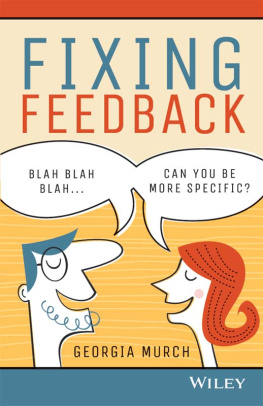The University of Chicago Press, Chicago 60637
The University of Chicago Press, Ltd., London
2019 by The University of Chicago
All rights reserved. No part of this book may be used or reproduced in any manner whatsoever without written permission, except in the case of brief quotations in critical articles and reviews. For more information, contact the University of Chicago Press, 1427 E. 60th St., Chicago, IL 60637.
Published 2019
Printed in the United States of America
28 27 26 25 24 23 22 21 20 19 1 2 3 4 5
ISBN-13: 978-0-226-65236-8 (cloth)
ISBN-13: 978-0-226-65253-5 (paper)
ISBN-13: 978-0-226-65267-2 (e-book)
DOI: https://doi.org/10.7208/chicago/9780226652672.001.0001
Library of Congress Cataloging-in-Publication Data
Names: Belgrad, Daniel, author.
Title: The culture of feedback: ecological thinking in seventies America / Daniel Belgrad.
Description: Chicago: The University of Chicago Press, 2019. | Includes bibliographical references and index.
Identifiers: LCCN 2019000821 | ISBN 9780226652368 (cloth: alk. paper) | ISBN 9780226652535 (pbk: alk. paper) | ISBN 9780226652672 (e-book)
Subjects: LCSH: EcologyUnited StatesPhilosophyHistory20th century. | EnvironmentalismUnited StatesHistory20th century.
Classification: LCC QH540.5 .B45 2019 | DDC 577.0973dc23
LC record available at https://lccn.loc.gov/2019000821

This paper meets the requirements of ANSI/NISO Z39.48-1992 (Permanence of Paper).
In conversations with my friends Mike Witmore, Ying Zhu, and Dell DeChant, I first encountered words and ideas that grew in importance as I came to write this book. At annual conferences of the Cultural Studies Association and as a visiting lecturer at the Philosophy Department of the University of Central Florida, I was given opportunities to benefit from the input of responsive audiences to early versions of my argument. Sandra Law and Ginny Gates-Fowler at the University of South Florida Library kept me supplied with a constant stream of crucial but hard-to-find sources, and Richard Schmidt helped me to gather the illustrations that I needed. I am especially grateful for the community of my colleagues in the Humanities and Cultural Studies Department at the University of South Florida, where Brendan Cook and Amy Rust read the entire book in manuscript and gave me their constructive criticisms. Outside the department, Fred Turner and John Wilson did me the same favor. Doug Mitchell, my editor at the University of Chicago Press, faithfully waited twenty years for this manuscript. Kyle Wagner and Erin DeWitt helped me to finalize it. I owe so much to my daughters, Lydia Lutsyshyna and Liz Valentine, and most of all to my wife, Catherine Valentine. They carry me forward.
Were just a biological speculation
Sitting here, vibrating
And we dont know what were vibrating about...
Oh, and if and when the law of man
Is not just, equal and fair
Then the laws of nature will come and do her thing.
Funkadelic, Biological Speculation from America Eats Its Young (1972)
We speak casually of improving a course of action by getting some feedback, as if that were the most natural thing in the world. But the idea of feedback itself has a history. During the Second World War, feedback developed as a term to refer to the dynamics of self-regulating mechanical systems, which correct their actions by feeding some effects back into the system as input to influence later actions. Due to the ability of such systems to self-correct, or learn, they could be considered intelligent.
Conversely, systems theory, which developed to describe how such systems worked, came to define intelligence itself as the ability to self-correct in response to feedback. Redefining intelligence this waynot as a uniquely human faculty produced by consciousness, but as the property of a system governed by feedback loopseventuated in new ways of thinking about the varieties of intelligence found in nature. This is what I mean by ecological thinking.
Variously termed ecology or cybernetics, the vision of the intelligent system governed by feedback loops has
Figure 1. An example of an ecosystem showing feedback loops (the nitrogen cycle), originally from Robert L. Smiths The Ecology of Man: An Ecosystem Approach (1972). (Robert L. Smith, Ecology and Field Biology, 5th ed., 1996. Reprinted by permission of Pearson Education, Inc., New York, New York.)
The idea of feedback dynamics as the connective tissue of systems, broadly conceived, became widespread in American intellectual discourse in the postwar decades, finding expression in academic specializations as diverse as engineering, sociology, biology, and psychology. Yet it was not until the early 1970s that a distinct popular culture emerged around the concept, as feedback became the governing trope for a counterculture that reoriented and reinvigorated the postwar culture of spontaneity and the psychedelic sixties. The idea that systems-based forms of intelligence were ubiquitous in the natural environment captured the public imagination during the seventies, resulting in the creation of new and widespread cultural practices. In this sense, ecological thinking is not identical with the science of ecology. As David Oates wrote in his study Earth Rising: Ecological Belief in an Age of Science, ecological thinking refers to the pattern of thinking called ecology [that] has proved to have potentials far beyond the science itself... [because] the ecological worldview is not a science: it is a belief system extrapolated from one.
Ecological thinking includes environmentalism but is not limited to it. Environmentalism emphasizes the fact that we humans are nested within natures complex systems. Therefore we must interact with those systems in ways that do not jeopardize our own survival. But ecological thinking extends to a social vision as well. Thus in 1973 philosopher Arne Nss summarized the principles of what he called deep ecology as opposed to a shallow, merely environmentalist focus, writing: There are deeper concerns which touch upon principles of diversity, complexity, autonomy, decentralization, symbiosis, egalitarianism, and classlessness.
Many Americans articulated the connections between their ecological thinking and the practices they derived from them, while many more engaged in those practices without overtly parsing their logic. This is in the nature of cultural forms as the vehicles of ideas, because practices convey meanings by embodying them rather than announcing them, using them to organize and shape ones actions. Central to the construction and communication of meaning through patterns
This book traces the manifestations of ecological thinking in a culture of feedback throughout the seventies. Its scope extends to wherever feedback systems were invoked to imagine natural phenomena as forms of intelligence, or mind. The result is not a comprehensive description of American culture in the seventies, nor is it a full account of the use of the feedback metaphor in intellectual and artistic circles since its inception. Instead, it is a delineation of how an enduring American counterculture responded to and shaped the historical imperatives of the decade.












 This paper meets the requirements of ANSI/NISO Z39.48-1992 (Permanence of Paper).
This paper meets the requirements of ANSI/NISO Z39.48-1992 (Permanence of Paper).